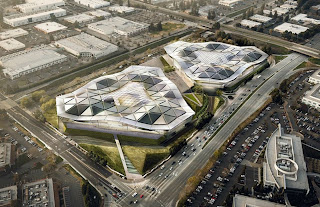An article describes how architecture is used to encourage encounter within the building, but shuns interaction with what is outside. It uses the computer parts manufacturer NVIDIAs new building in the USA as an example - though Apple is also criticized.
"The idea is to increase spontaneous run-ins between workers—but on the outside, the building turns away from its neighbors, shielded from the surrounding streetscape by a thin, faceted hillocks"
The article implies that this kind of architecture results in a poor outcome for the public realm, and isolates staff from the rest of the city.
It's also not just building design that can affect the city (for better or worse). For instance, some business provide private bus services to their staff - which is a good idea to get cars off the road. However, interestingly, the article states that:
"A strict segregation between public and private transit is emerging. You have a private bus where you can get work done, and then you go to your private office park, and we see that it has a trickle down effect in the larger urban form. And that’s when it starts to be really problematic, and kind of undemocratic.”
"The interest of companies have always driven new growth. Except these days, companies aren't just constructing buildings—they're acting as designers, planners, and policy-makers of entire neighborhoods, too."
What do you think? Is the 'closed-circuit' nature of big tech hubs an essential enabler of innovation? To what extent do you think they are they 'undemocratic intrusions of public life'?
Thanks to Rupert Dance for sending me this link. Read more at Gizmodo.










